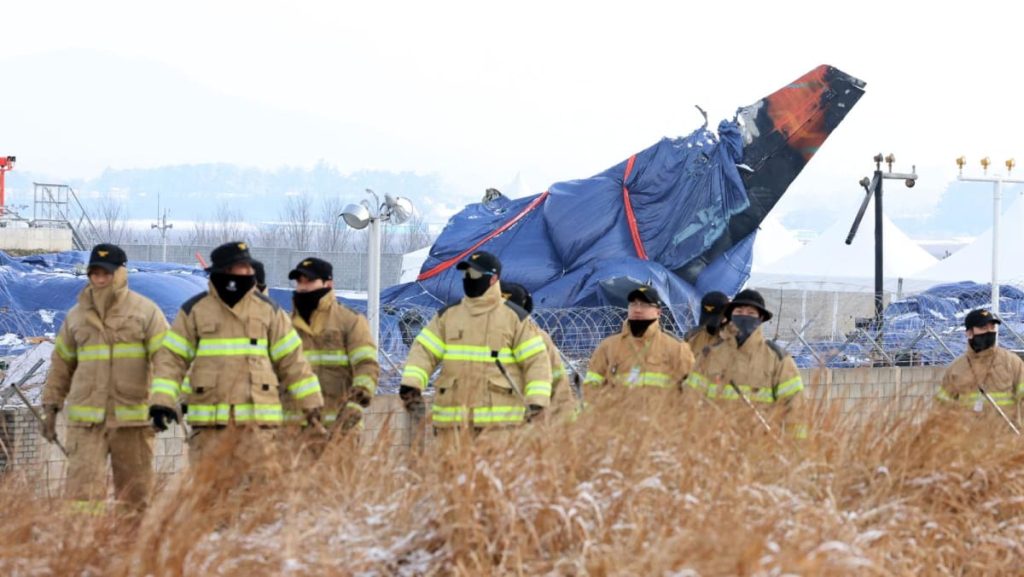The tragic crash of Jeju Air Flight 7C2404 on December 29, 2024, claimed the lives of 179 individuals, marking the deadliest aviation disaster in South Korean history. The Boeing 737-800, en route from Thailand to Muan, South Korea, met a fiery end after a belly landing that culminated in a collision with a concrete barrier at the Muan airport. The ensuing investigation has focused intensely on retrieving and analyzing data from the flight’s black boxes – the Cockpit Voice Recorder (CVR) and Flight Data Recorder (FDR) – to unravel the sequence of events that led to the catastrophe. However, recent revelations from South Korea’s transport ministry have introduced a significant hurdle: the black boxes ceased recording approximately four minutes prior to the impact, leaving a critical gap in the crucial final moments of the flight.
The revelation of data loss from the black boxes poses a substantial challenge to investigators. The missing four minutes of data could contain critical information regarding the flight crew’s actions, the aircraft’s performance, and any potential anomalies that might have contributed to the accident. The timing of the data cessation, just minutes before the crash, makes it particularly frustrating, as it obscures the precise circumstances leading up to the belly landing and the subsequent collision with the localizer, the runway-end barrier intended to aid aircraft landings. The localizer, ironically designed as a safety feature, tragically played a role in exacerbating the crash’s severity. Investigators must now grapple with the absence of this crucial data while exploring alternative avenues to piece together the final moments of the flight.
The damaged FDR was initially deemed unrecoverable by South Korean authorities, prompting its transfer to the US National Transportation Safety Board (NTSB) laboratory for advanced analysis. While the US NTSB’s involvement offered a glimmer of hope for data retrieval, the confirmed data loss from both the CVR and FDR significantly complicates the investigation. The fact that both recorders stopped functioning simultaneously raises questions about a potential common cause for the failure. Investigators will need to meticulously examine the recorders themselves to determine the reason for the data loss, considering factors like mechanical malfunction, electrical issues, or damage sustained during the impact. Understanding the reason behind the data loss is crucial, not only for this specific investigation but also for improving the reliability and robustness of black box technology in the future.
The South Korean transport ministry has affirmed its commitment to investigating the cause of the data loss as part of the broader accident investigation. This will likely involve a thorough examination of the black boxes’ internal components, as well as an analysis of any available data from the aircraft’s other systems. While the missing four minutes represent a significant obstacle, investigators will continue to explore alternative sources of information. This might include radar data, air traffic control communications, eyewitness accounts, and physical evidence from the wreckage. The combined efforts of South Korean and US investigators are crucial for determining the root cause of the accident and implementing measures to prevent similar tragedies in the future.
The Jeju Air crash has deeply impacted South Korea, prompting widespread mourning and the establishment of memorials across the nation. The loss of 179 lives has resonated deeply with the public, underscoring the vital importance of aviation safety. The ongoing investigation carries the weight of this national tragedy, and its findings will be crucial for providing closure to the victims’ families and for ensuring the safety of future air travel. The transparency and thoroughness of the investigation are paramount, as the public seeks answers and reassurance about the measures being taken to prevent such devastating accidents from occurring again.
The investigation into the Jeju Air crash underscores the complexity of modern accident investigations, where the reliance on black box data is often paramount. The unexpected data loss in this case highlights the need for continuous improvement in black box technology, including exploring redundant recording mechanisms and enhancing data survivability. Furthermore, the investigation emphasizes the importance of a multi-faceted approach, incorporating all available evidence and expertise to arrive at a comprehensive understanding of the events leading to the tragedy. The lessons learned from this devastating accident will undoubtedly shape future aviation safety protocols and contribute to a safer air travel environment for all.

